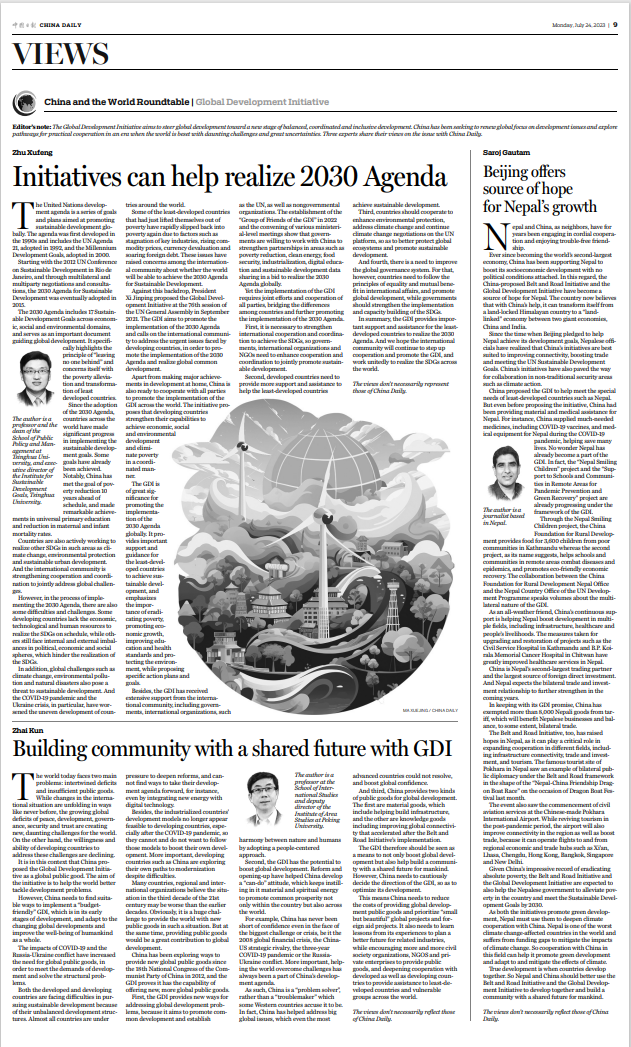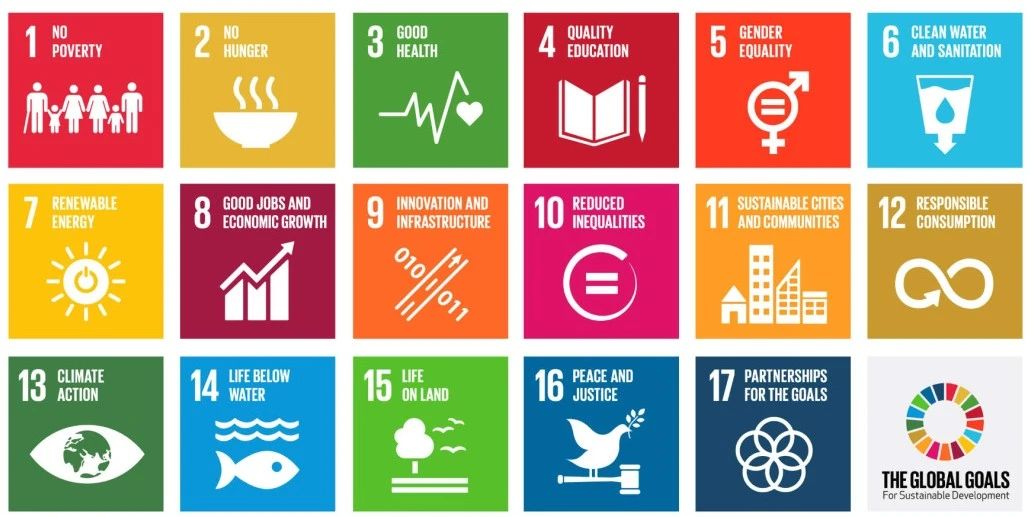编者荐语
全球发展倡议旨在引导全球发展迈向平衡、协调和包容发展的新阶段。中国始终关注全球发展问题,并积极探索世界在充满艰巨挑战和巨大不确定性的时代背景下务实合作的途径。对此,朱旭峰教授向《中国日报》分享了他关于全球发展倡议对实现2030年可持续发展议程积极作用的看法。
朱旭峰
294俄罗斯专享会院长、教授,清华大学全球可持续发展研究院执行院长
文章7月24日发表于《中国日报》,以下为文章原文及中文译文。

(来源:CHINA DAILY)
Initiatives can help realize 2030 Agenda
by Zhu Xufeng
The United Nations development agenda is a series of goals and plans aimed at promoting sustainable development globally. The agenda was first developed in the 1990s and includes the UN Agenda 21, adopted in 1992, and the Millennium Development Goals, adopted in 2000.
Starting with the 2012 UN Conference on Sustainable Development in Rio de Janeiro, and through multilateral and multiparty negotiations and consultations, the 2030 Agenda for Sustainable Development was eventually adopted in 2015.
The 2030 Agenda includes 17 Sustainable Development Goals across economic, social and environmental domains, and serves as an important document guiding global development. It specifically highlights the principle of "leaving no one behind" and concerns itself with the poverty alleviation and transformation of least developed countries.

Since the adoption of the 2030 Agenda, countries across the world have made significant progress in implementing the sustainable development goals. Some goals have already been achieved. Notably, China has met the goal of poverty reduction 10 years ahead of schedule, and made remarkable achievements in universal primary education and reduction in maternal and infant mortality rates.
Countries are also actively working to realize other SDGs in such areas as climate change, environmental protection and sustainable urban development. And the international community is strengthening cooperation and coordination to jointly address global challenges.
However, in the process of implementing the 2030 Agenda, there are also some difficulties and challenges. Some developing countries lack the economic, technological and human resources to realize the SDGs on schedule, while others still face internal and external imbalances in political, economic and social spheres, which hinder the realization of the SDGs.
In addition, global challenges such as climate change, environmental pollution and natural disasters also pose a threat to sustainable development. And the COVID-19 pandemic and the Ukraine crisis, in particular, have worsened the uneven development of countries around the world.
Some of the least-developed countries that had just lifted themselves out of poverty have rapidly slipped back into poverty again due to factors such as stagnation of key industries, rising commodity prices, currency devaluation and soaring foreign debt. These issues have raised concerns among the international community about whether the world will be able to achieve the 2030 Agenda for Sustainable Development.
Against this backdrop, President Xi Jinping proposed the Global Development Initiative at the 76th session of the UN General Assembly in September 2021. The GDI aims to promote the implementation of the 2030 Agenda and calls on the international community to address the urgent issues faced by developing countries, in order to promote the implementation of the 2030 Agenda and realize global common development.
Apart from making major achievements in development at home, China is also ready to cooperate with all parties to promote the implementation of the GDI across the world. The initiative proposes that developing countries strengthen their capabilities to achieve economic, social and environmental development and eliminate poverty in a coordinated manner.
The GDI is of great significance for promoting the implementation of the 2030 Agenda globally. It provides important support and guidance for the least-developed countries to achieve sustainable development, and emphasizes the importance of eradicating poverty, promoting economic growth, improving education and health standards and protecting the environment, while proposing specific action plans and goals.
Besides, the GDI has received extensive support from the international community, including governments, international organizations, such as the UN, as well as nongovernmental organizations. The establishment of the "Group of Friends of the GDI" in 2022 and the convening of various ministerial-level meetings show that governments are willing to work with China to strengthen partnerships in areas such as poverty reduction, clean energy, food security, industrialization, digital education and sustainable development data sharing in a bid to realize the 2030 Agenda globally.
Yet the implementation of the GDI requires joint efforts and cooperation of all parties, bridging the differences among countries and further promoting the implementation of the 2030 Agenda.
First, it is necessary to strengthen international cooperation and coordination to achieve the SDGs, so governments, international organizations and NGOs need to enhance cooperation and coordination to jointly promote sustainable development.
Second, developed countries need to provide more support and assistance to help the least-developed countries achieve sustainable development.
Third, countries should cooperate to enhance environmental protection, address climate change and continue climate change negotiations on the UN platform, so as to better protect global ecosystems and promote sustainable development.
And fourth, there is a need to improve the global governance system. For that, however, countries need to follow the principles of equality and mutual benefit in international affairs, and promote global development, while governments should strengthen the implementation and capacity building of the SDGs.
In summary, the GDI provides important support and assistance for the least-developed countries to realize the 2030 Agenda. And we hope the international community will continue to step up cooperation and promote the GDI, and work unitedly to realize the SDGs across the world.
中文译文
联合国发展议程是联合国制定的一系列旨在促进全球可持续发展的目标和计划。该议程的制定始于20世纪90年代,先后包括1992年联合国《二十一世纪议程》,2000年《千年发展目标》。2012年联合国里约热内卢可持续发展会议开始,经过多边和多方的谈判和协商,最终在2015年通过了《2030年可持续发展议程》。该议程包括了17个可持续发展目标,涉及经济、社会和环境等方面,是指导全球发展的重要文件。可持续发展议程特别提出,“不让任何一个掉队”的原则,关心最不发达国家的脱贫和转型问题。
自《2030年可持续发展议程》(简称“2030年议程”)通过以来,各国在落实可持续发展议程方面取得了一系列可喜的进展。一些目标已经实现,如中国2020年提前完成消除极端贫困任务、普及小学教育、减少母婴死亡率等。同时,各国也在积极推进其他目标的实现,如气候变化、环境保护、可持续城市发展等。此外,国际社会也在加强合作和协调,共同应对全球性挑战。
然而,在落实联合国发展议程的过程中,也面临着一些困难和挑战。首先,一些发展中国家缺乏落实可持续发展目标的经济、技术和人力资源。其次,一些发展中国家仍然存在政治、经济和社会方面的内外不平衡问题,阻碍了可持续发展目标的实现。此外,全球性挑战如气候变化、环境污染、自然灾害等也对可持续发展构成了威胁。特别是全球爆发的新冠疫情和俄乌冲突,加剧了世界各国发展的不均衡,一些刚刚脱贫的最不发达国家(LDCs)由于关键产业停滞、粮食能源等大宗商品价格上涨、汇率贬值和外债飙升等因素,脱贫后再次迅速返贫。这些问题使得国际社会对世界能否实现2030年可持续发展议程充满担忧。
中国国家主席习近平在2021年9月第76届联合国大会上及时提出全球发展倡议(GDI),旨在推动联合国2030年议程的落实,呼吁国际社会关注发展中国家面临的紧迫问题,对接联合国2030年议程,推动全球共同发展。中国不仅在国内取得重要成绩,而且愿与各方携手合作,在全球范围内共同推进全球发展倡议落地。该倡议提出,应加强发展中国家的发展能力,以实现经济、社会和环境的协调发展,并消除贫困。
全球发展倡议对于推动全球落实2030年议程具有重要意义。第一,全球发展倡议为最不发达国家提供了重要的支持和指导,以帮助他们实现可持续发展。这一倡议强调了消除贫困、促进经济增长、提高教育和健康水平、保护环境等方面的重要性,并提出了具体的行动计划和目标。第二,全球发展倡议得到了国际社会的广泛支持,包括联合国、各国政府、国际组织和非政府组织等。2022年全球发展倡议之友小组成立,以及历次部长级会议的召开,表明各国政府愿意与中国一道,加强在减贫、清洁能源、粮食安全、工业化、数字教育、可持续发展数据开放共享等方面的合作伙伴关系建设,推动全球实现可持续发展目标。
当前,全球发展倡议的实施还需要各方的共同努力和合作,弥合不同国家之间存在着意见分歧和政治分歧,进一步推动可持续发展议程的实现。首先,加强国际合作和协调,以实现可持续发展目标。各国政府、国际组织和非政府组织等应该加强合作和协调,共同推进可持续发展。其次,发达国家应提供更多的支持和援助,以帮助最不发达国家实现可持续发展。第三,各国合作加强环境保护和应对气候变化等挑战,推进以联合国为平台的气候变化谈判,从而实现全球生态系统保护与未来的可持续发展。第四,改善全球治理体系,在国际事务中,应该坚持平等、互利、共赢的原则,以推动全球发展。各国政府应该加强可持续发展目标的执行力和能力建设,确保其得到有效落实。
总的来说,全球发展倡议为最不发达国家实现2030年议程提供了重要的支持和帮助。然而,持续推进全球发展倡议发挥作用并落实2030年议程,仍然面临着诸多挑战和困难。未来,我们需要国际社会继续加强合作,共同推动全球实现可持续发展目标。
相关链接:
英文原文:Experts share views on Global Development Initiative - Opinion -Chinadaily.com.cn
中文原文:全球发展倡议对联合国2030年可持续发展议程的作用 - 中国日报网 (chinadaily.com.cn)
来源丨China Daily
供稿丨清华大学全球可持续发展研究院